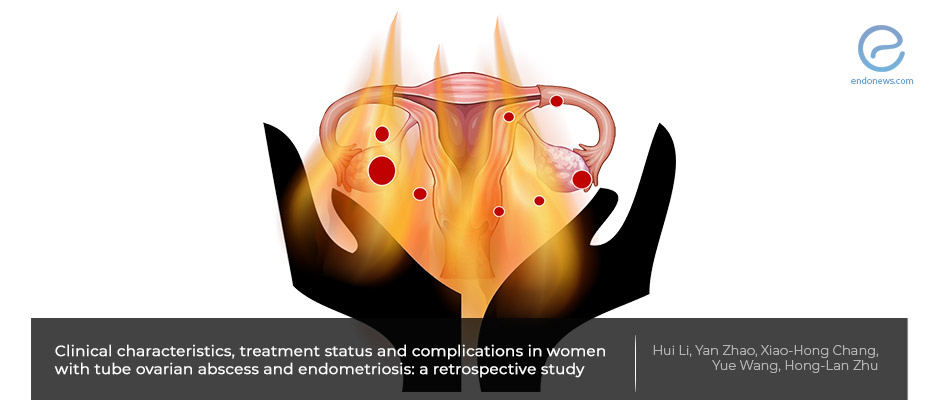Tubo-ovarian abscess and endometriosis
Apr 20, 2021
Myth or real? Devil sisters: tuba ovarian abscess and endometriosis
Key Points
Highlights:
- The presence of endometriosis in patients with tubo-ovarian abscess is associated with severe bleeding during surgery and high complication rates.
Importance:
- The study focused on the effect of the presence of endometriosis on clinical features, treatment outcomes, and complications of women with tubo-ovarian abscess.
What's done here:
- A total of 113 women diagnosed as tubo-ovarian abscess and endometriosis were enrolled in the study.
- These patients were divided into two groups, "patients with tubo-ovarian abscess and endometriosis" (n=20, study group), and patients with "only tubo-ovarian abscess" (n=93, control group).
- Groups were compared in terms of demographic characteristics, symptoms, risk factors for tuba ovarian abscess, serum biochemical evaluation, treatment-related factors, and complications.
Key Results:
- Groups were not significantly different in terms of risk factors (intrauterine ring, in-vitro fertilization, history of gynecologic operation, or pelvic inflammatory disease for developing a tube ovarian abscess.
- Patients with endometriosis were significantly younger in comparison to patients without.
- The group with abscess and endometriosis had a significantly higher infertility history rate and lower pregnancy parities.
- Groups had comparable serum blood results except blood platelet count was significantly higher in patients with tuba ovarian abscess and without endometriosis.
- The presence of endometriosis significantly increases blood loss during operation and increases complication rates.
Limitations:
- The retrospective nature and relatively small patients’ number of study limited the predictive value of the results.
- The study included data from single-center, and the number and experience of the surgeon(s) were not detailed.
Lay Summary
A tubo-ovarian abscess is the result of pelvic inflammatory disease in women and the previous reports demonstrated that almost one of the third women with a pelvic inflammatory disease had a tubo-ovarian abscess.
The main treatment modalities for tubo-ovarian abscess are antibiotic regimen and surgical exploration if necessary. On the other hand, endometriosis patients have an increased risk of pelvic inflammatory disease, resulting in treatment difficulties and longer hospitalization
Studies that investigated the effect of endometriosis on the tubo-ovarian abscess in terms of clinical presentation, serum blood outcomes, treatment modality, and complications, are limited. Dr. Hong-lan's team from the Department of Obstetrics and Gynecology of Peking University People`s Hospital, China, examined the patients with tubo-ovarian abscess and compared tubo-ovarian abscess with endometriosis to other causes of tubo-ovarian abscess.
The authors found that the patients with tube ovarian abscess and endometriosis had a significantly younger age, lower parity rate, and higher infertility history.
On the other side, the risk factors for tuba ovarian abscess including intrauterine ring, in vitro fertilization, history of gynecologic operation, or pelvic inflammatory disease were not significantly different between the two groups. In addition, the presence of endometriosis concomitant with tuba ovarian abscess did not have different blood biochemistry values, other than the increased platelet count.
The comparison of groups in terms of management factors of tuba ovarian abscess with and without endometriosis showed that the presence of endometriosis was associated with higher blood loss during surgery and higher complication rates. Thus, the authors stated that physicians should pay more attention to the treatment when tubo-ovarian abscesses are accompanied by endometriosis.
Research Source: https://pubmed.ncbi.nlm.nih.gov/33736641/
tube ovarian abscess endometriosis

